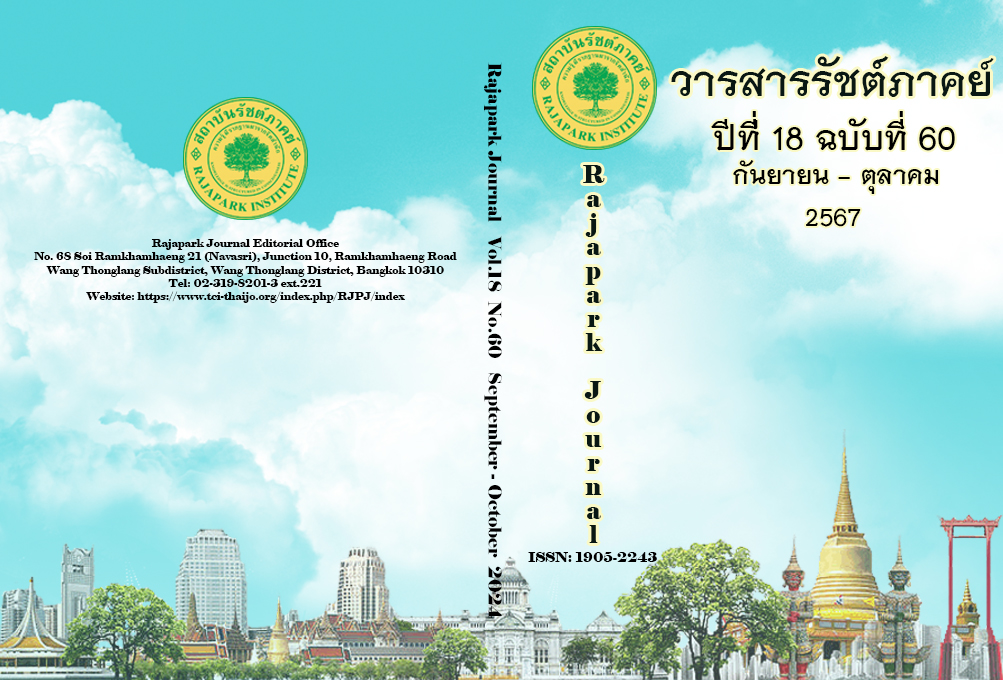Allocating Appropriate Budgets to Agencies Responsible for Efficient Road Maintenance
Main Article Content
Abstract
This research aims to study (1) appropriate budgeting guidelines for road maintenance for major agencies and (2) the impact of road maintenance following the enforcement of the Decentralization Act of 1999. The research employs a mixed-methods approach, including quantitative research to study the opinions of 400 road users regarding major road agencies and qualitative research through in-depth interviews with 21 high-ranking officials experienced in managing road maintenance budgets. The results indicate that the allocation of road maintenance budgets needs to be revised, taking into account traffic volume and the physical characteristics of each type of road. In terms of impact, local roads are the most affected due to inefficient management, a lack of skilled personnel, and insufficient budgets. Therefore, it is concluded that improving budget allocation guidelines to reflect the physical characteristics and responsibilities of the agencies will enable the appropriate distribution of resources and budgets according to standards and formats. Emphasizing existing expert agencies will help maintain road conditions effectively and efficiently.
Article Details

This work is licensed under a Creative Commons Attribution-NonCommercial-NoDerivatives 4.0 International License.
Views and opinions appearing in the Journal it is the responsibility of the author of the article, and does not constitute the view and responsibility of the editorial team.
References
Chaisuknipat, C., Ngaosumat, P., Panchan, T., Siangjaew, N., & Kubaramee, N. (2022). The concept of road routine maintenance work and planning for local authority. In The 27th National Convention on Civil Engineering (NCCE27), (pp. 1-8). Chiang Rai, Thailand. https://conference.thaince.org/index.php/ncce27/article/view/1377
Chen, V.Y.C., Hui-Pang, L., Liu, C-H., Liou, J.J.H., Tzeng, G-H., Yang, L.-S. (2011). Fuzzy MCDM approach for selecting the best environment-watershed plan. Applied Soft Computing, 11(1), 265-275. DOI:10.1016/j.asoc.2009.11.017
Injan, W., Chandrarasamart, R., Yupas, Y., & Jeerasombat, S. (2009). The operation for transferred responsibilities for infrastructure of Muang Sub-district administrative organization, Mhasarakham Province. Rajabhat Maha Sarakham University Journal, 3(2), 113-122. https://so05.tci-thaijo.org/index.php/rmuj/article/view/30128
Kabir, G., & Hasin, A.A.M. (2011). Comparative analysis of AHP and fuzzy AHP models for multicriteria inventory classification. International Journal of Fuzzy Logic Systems (IJFLS), 1(1), 1-16. https://www.researchgate.net/publication/267237307_Comparative_analysis_Of_AHP_and_fuzzy_AHP_models_for_multicriteria_inventory_classification
Kwong, C.K., & Bai, H. (2002). A fuzzy APH approach to the determination of importance weights of customer requirement in quality function deployment. Journal of Intelligent Manufacturing, 13(5), 367-377. DOI:10.1023/A:1019984626631
Saaty, T.L. (1980). The Analytic Hierarchy Process. McGraw-Hill.
Tesawiwatkul, B., Saijampa, N., Sriram, N., & Meechai, T. (2022). The politics of the transfer of missions of the development of rural roads to local government organization. Journal of Social Science and Buddhistic Anthropology, 7(6), 163-177. https://so04.tci-thaijo.org /index.php/JSBA/article/view/255654
Vaidya, O.S., & Kumar, S. (2006). Analytic hierarchy process: an overview of applications. European Journal of Operational Research, 169, 1-29. http://dx.doi.org/10.1016/j.ejor.2004.04.028
Wu, H. Y., Tzeng, G-H., & Chen, Y-H. (2009). A fuzzy MCDM approach for evaluating banking performance based on balanced scorecard. Expert Systems with Applications, 36(6), 10135-10147. https://doi.org/10.1016/j.eswa.2009.01.005
Yamane, T. (1973). Statistics: An introductory analysis (3rd ed.). Harper & Row.
Yimsiri, S., & Ratanaikom, W. (2020). Factors affecting road construction management of local government organizations. In The 25th National Convention on Civil Engineering (NCCE25), (pp. 1-7). Chonburi, Thailand. https://conference.thaince.org/index.php/ncce25/article /view/602


